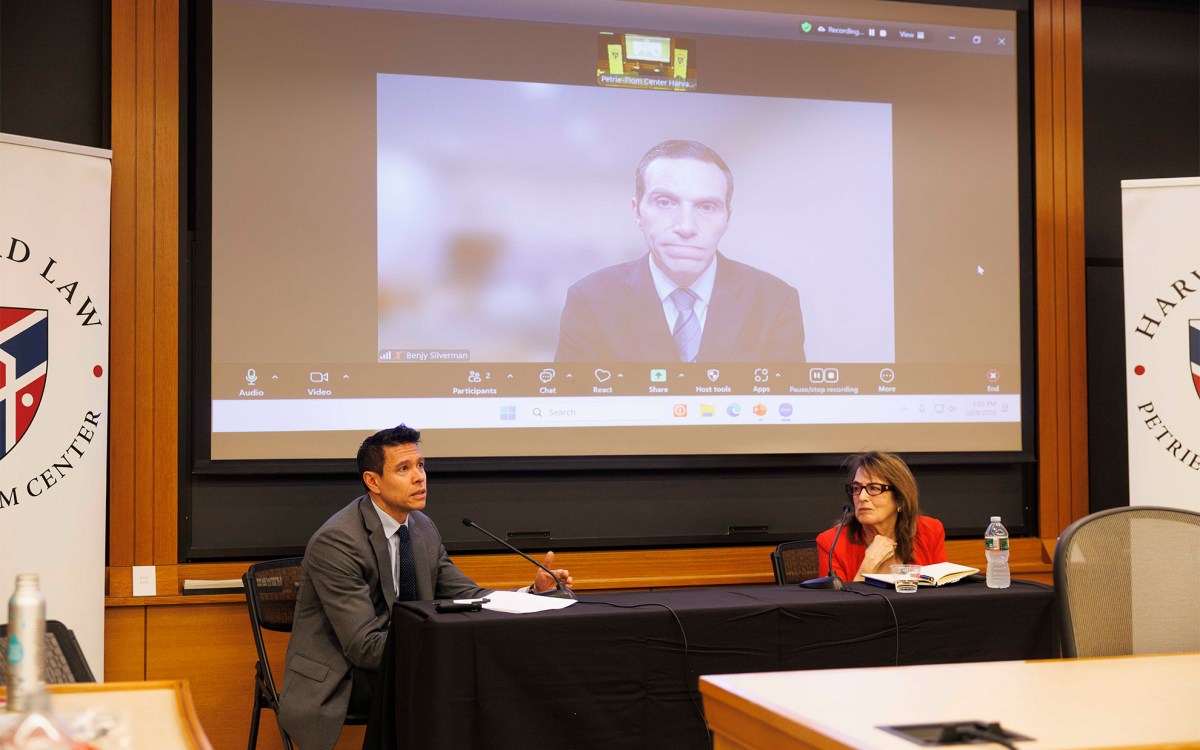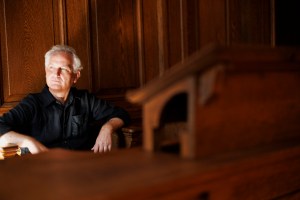Tag: Climate
-
Campus & Community
‘Green’ University celebration commences
If you flew over Harvard University in a small plane, you would see only a few outward and obvious signs of sustainability. You would see a glittering solar array on Shad Hall at Harvard Business School, a landscaped green roof on Gund Hall, home of Harvard’s Graduate School of Design, and you would see a…
-
Nation & World
HBS summit addresses future
The timing couldn’t have been worse, or perhaps better, for Harvard Business School’s (HBS) “Centennial Global Business Summit,” a three-day conference Oct. 12-14.
-
Science & Tech
Arctic ice is thinning steadily
There was a polar bear sighting at Harvard last week. At Pforzheimer House on Thursday (Oct. 2), global warming expert James J. McCarthy delivered a crisp summary of how fast ice is melting in the Arctic — and why we should care. The audience of 80 took in his companion slide show, including images of…
-
Science & Tech
Exelon executive offers regulations, incentives to ‘green’ energy supply
The head of the nation’s largest nuclear power plant owner decried America’s lack of an energy policy Monday night (Oct. 6) and laid out a five-point plan featuring a mix of new regulations and financial incentives for coal, nuclear, and renewable power sources as a way to ‘green’ America’s energy supply.
-
Science & Tech
Island nation president plans for extinction
The leader of the South Pacific island nation of Kiribati laid out an extraordinary plan Monday (Sept. 22) that would scatter his people through the nations of the world as rising sea levels submerge the islands they have called home for centuries.
-
Health
Harvard Forest: 3,500 acres, global impact
Harvard may be rooted in Cambridge, but it has a lot more roots in the small north-central Massachusetts town of Petersham. That’s where you’ll find the woods, streams, and fields of the Harvard Forest, a 3,500-acre research and teaching facility that’s been part of the University for more than a century. Having been closely monitored…
-
Nation & World
Electric cars, ‘cap and trade,’ and more
R. James Woolsey Jr., a former director of the Central Intelligence Agency, has a favorite personal strategy for ensuring U.S. domestic security: his Toyota Prius hybrid, upgraded with an A123 conversion kit that allows it to run largely on a battery rechargeable by house current.
-
Nation & World
Sachs insists new technologies essential
Jeffrey Sachs, the internationally renowned economist, returned to his alma mater Monday (April 14) to give his prescription for saving the world. Sustainable development, he said, is the “central challenge of our time.”
-
Campus & Community
Museum of Science to honor McCarthy with Walker Prize
James McCarthy, the Alexander Agassiz Professor of Biological Oceanography in the Museum of Comparative Zoology, will accept the 2008 Walker Prize from the Boston Museum of Science on April 7. The prize recognizes “meritorious published scientific investigation and discovery” in any scientific field.
-
Science & Tech
Workshop ponders: Post-Kyoto, what next?
With the Kyoto Protocol’s first commitment period expiring in 2012, the Harvard Project on International Climate Agreements hosted a workshop of leading thinkers Friday (March 14) to help determine what comes next.
-
Nation & World
Can corporations police themselves effectively?
On the surface, one might argue, it looks like the business world is headed in a decidedly socially conscious direction. Coffee giant Starbucks supports fair prices for its coffee growers. Wal-Mart, the department store dynasty, has instituted a number of measures to lighten its environmental footprint. Companies everywhere tout their eco-friendly products and packaging, and…
-
Campus & Community
Environmental work honored by HMS
The Center for Health and the Global Environment at Harvard Medical School (HMS) has named Kofi Annan and Alice Waters as its 2008 Global Environmental Citizen Award recipients.
-
Science & Tech
Holdren talks back to skeptics of global warming
“Global warming is a misnomer,” said John P. Holdren, speaking Tuesday night (Nov. 6) at the John F. Kennedy Jr. Forum at the Kennedy School. “It implies something gradual, uniform, and benign. What we’re experiencing is none of these.”
-
Science & Tech
Engineered weathering process could mitigate global warming
Researchers at Harvard University and Pennsylvania State University have invented a technology, inspired by nature, to reduce the accumulation of atmospheric carbon dioxide (CO2) caused by human emissions.
-
Science & Tech
If not in atmosphere, where does carbon go?
A prominent atmospheric scientist Monday (Oct. 29) called for more research into natural carbon “sinks,” which today absorb almost half of man-made carbon dioxide released into the atmosphere and which will play a large role in determining the extent of future global warming.
-
Health
Biologists remember landmark theory
Forty years ago, Edward O. Wilson and Robert H. MacArthur described how size and isolation determine how many species an island can support. Last week, biologists gathered to mark the theory’s anniversary, calling it a “pivotal point” in ecology’s relatively short history.
-
Campus & Community
Crimson with a touch of green
When Drew Faust is inaugurated as Harvard’s 28th president this week, there will be more than a touch of green to go with the crimson.
-
Campus & Community
Harvard Forest announces Bullard Fellows
Harvard Forest recently announced the 2007-08 Charles Bullard Fellows in Forest Research. The purpose of this fellowship program, established in 1962, is to support advanced research and study by persons who show promise of making important contributions, either as scholars or administrators, to forestry defined in its broadest sense as the human use and study…
-
Campus & Community
City board gives approval to Allston Science Complex plans
Harvard University has received the approval from the Board of Directors of the Boston Redevelopment Authority (BRA), the city’s planning and economic development agency, for plans for the Harvard Allston Science Complex, the first new academic building of the University’s planned extended campus in Allston. Following completion of the zoning approval, construction can begin. Formal…
-
Science & Tech
Digging for solutions to energy crisis
In the 1970s, Iceland was one of the poorest countries in Europe. Today it is one of the richest, with a per capita GDP higher than that of Denmark, from which it won full independence in 1944.
-
Campus & Community
Harvard to limit greenhouse gas emissions in new Allston construction
Harvard University this week reiterated its long-standing commitment to improving the environment, voluntarily agreeing to limit greenhouse gas emissions from new buildings constructed on its Allston campus in ways that…
-
Campus & Community
The biggest challenge of sustainability: Changing minds
In 1999, the Harvard School of Public Health (HSPH) made plans to move its offices to the Landmark Center, a converted Sears, Roebuck and Co. warehouse in Boston. Danny Beaudoin — the School’s manager of operations, energy, and utilities — was asked to look into sustainable design for the renovation: a realm of low-emitting paints,…
-
Nation & World
French PM: Cooperation is the key
French Prime Minister Dominique de Villepin said the world now stands at a major crossroads, but that acting together the United States and Europe could lead the way in solving economic imbalances, ethnic and religious tensions, and the threat to the planet’s natural resources.
-
Campus & Community
Holdren delivers keynote at AAAS conference
Teresa and John Heinz Professor of Environmental Policy at the Kennedy School of Government John Holdren recently delivered the keynote address at the annual conference of the American Association for the Advancement of Science (AAAS) last month in San Francisco. The director of the Science, Technology, and Public Policy program at the Belfer Center and…
-
Health
Wilson urges alliance to save species
Edward O. Wilson sees a future in which science and religion join forces to save the natural world. Without such an alliance, said the legendary Harvard biologist and author, an alternative future is in store for the human race: one of accelerating environmental cataclysm fueled by overpopulation, deforestation, declining fisheries, and climate change.
-
Science & Tech
Arctic hit by global warming first
Scientists from the eight nations bordering the Arctic recently enlisted representatives of the region’s native peoples to help assess climate change there. What they found put a human face on a debate often involving distant projections and abstract numbers. Less snow, less sea ice, freezing rain in winter, and the appearance of mosquitoes and robins,…
-
Science & Tech
Deep-sea sediments could safely store man-made carbon dioxide
An innovative solution for the man-made carbon dioxide fouling our skies could rest far beneath the surface of the ocean, say scientists at Harvard University. They’ve found that deep-sea sediments could provide a virtually unlimited and permanent reservoir for this gas that has been a primary driver of global climate change in recent decades, and…


